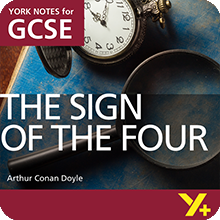Examiner's Notes
You assessed this answer as a Lower.
Hover over the highlighted text to read the examiner’s comments.
- in this extract?
- in the novella as a whole?
Holmes is presented to us as a complex and unique character. Within the extract he makes almost a plea, 'Give me the most abstruse cryptogram or the most intricate analysis.' This suggests that work, which provides 'mental exaltation' is a basic need for a man like Holmes. In the opening to the novella, we have just witnessed Watson's concern for Holmes's drug taking which, although disturbing to a modern reader, suggests that Holmes is willing to experiment on his own mind. He seems to view everything he does scientifically and as an intellectual exercise. 'Its secondary action is a matter of small moment', he concludes about the cocaine.
Holmes has invented his own profession as 'the only unofficial consulting detective'. Perhaps this implies he finds it difficult to cope with any other methodology apart from his own. It could also suggest a little arrogance on his part, something Watson considers when he says he is 'irritated by the egotism' of his colleague.
Holmes operates rationally and logically, pinpointing evidence with close examination. ‘You have an extraordinary gift for minutiae’, Watson remarks. Yet there is also evidence that he works instinctively too. This is most closely seen in the language used to describe Holmes at the crime scene where he is compared to a bird with his ‘beady eyes’ and a bloodhound, ‘picking out a scent’. The triplet, ‘swift, silent and furtive’, describes his method but also makes an interesting contrast. This language might also describe how a criminal operates and Watson even considers ‘what a terrible criminal’ Holmes might have made. It seems that Holmes can anticipate the actions and thought processes of the suspects. This is certainly the case when he explores the crime scene at Pondicherry Lodge.
Though Jones dismisses him as a ‘theorist’ it is Holmes who gathers enough clues to allow him to present an almost complete hypothesis almost immediately. His mind seems to work at a faster pace than the others, leading to his impatience and frustration with others. He chides Watson for this, ‘My dear Watson, try a little analysis yourself.’ In the extract we see how Holmes is dismissive of the police force and considers them to be ‘out of their depths’. However, he later criticises Jones’s swift pace and ‘immense display of energy’ with gentle humour when he tells Watson Jones has arrested everyone at Pondicherry Lodge, which adds another layer of interest and complexity to Holmes's character.
Though connected with logic, Conan Doyle presents his detective as inventive and creative in his approaches too: his use of disguise, his contacts, his methods of questioning are just some examples. Holmes’s knowledge and memory seem extensive. He has unusual skills – he is athletic, a linguist, musical. Conan Doyle’s character is out of the ordinary and able to rise above the mundane.
However, Conan Doyle also presents Holmes as representing aspects of characters associated with the Gothic genre, in both the darker elements of his nature, and in the way duality is reflected through his relationship with Watson. This shows that however original Holmes appears, the author was drawing on the ideas of his time to create his detective.
Holmes is accomplished and skilled but he does have flaws. The extract has shown Holmes to be paralysed by boredom and desperate for stimulation. When the pace of the novella slows down as the search for the ‘Aurora’ becomes fruitless, Holmes becomes ‘morose’ and ‘dejected’. His periods of dark depression suggest he is a man who was not born for ‘the dull routine of existence’. In this way, perhaps Watson is right to conclude this unique individual is ‘a calculating machine!’
